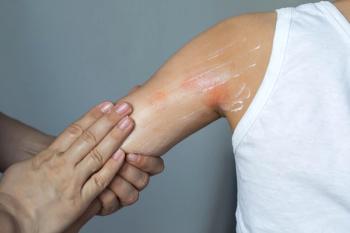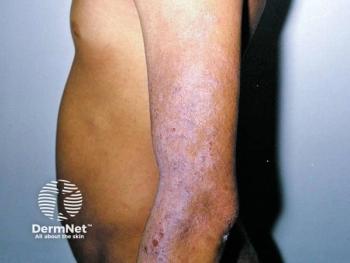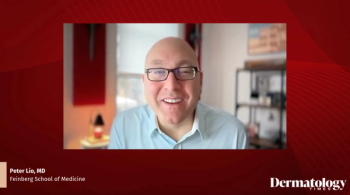
A meaningful life of service
Pediatric dermatologist Alanna Bree, M.D., left a secure position with a well-respected hospital to embark on a faith-filled professional journey. In this profile, Dr. Bree shares her story of practice, discovery and renewal.
To restore her love for practicing pediatric dermatology, Alanna F. Bree, M.D., had to quit what she thought was a dream job and instead, embark on a faith-fueled journey.
Dr. Bree and her husband, Douglas Bree, M.D., were passionate about pursuing careers in medicine. With two young children, the family struggled to pay for their medical educations. They were broke, but determined.
“I cleaned people’s houses and sold Discovery Toys to make enough money, so we could get through school and care for our kids,” Dr. Bree says.
She remembers diluting milk to save money. And, the children were on the government’s Women, Infants, and Children (WIC) program to make ends meet.
But they got through the lean times with Dr. Bree graduating from Southern Illinois University School of Medicine in Springfield, Ill., completing her dermatology residency at Saint Louis University and pediatric dermatology fellowship training at Northwestern University/Children’s Memorial Hospital in Chicago.
“I finally had this spectacular job at Baylor and Texas Children’s, and I was being recognized in pediatric dermatology for my early career achievements. We had a nice house, nice cars and our children went to good private schools. It was what I worked so long and hard for all those ears,” Dr. Bree says.
But she wasn’t happy. She was burned out and disenchanted by the politics and regulatory hurdles in medicine. So, in 2010, she quit.
Driven by her faith, Dr. Bree took a two-year hiatus from organized medicine to volunteer as a pediatric dermatologist on overseas mission trips. She’s traveled to Nicaragua, Guatemala, Kenya and Tanzania treating children with skin disorders that are easily treated in the United States, but not so in these countries where early detection is not commonplace.
In Kenya, she encountered a patient with a rare genetic skin disorder that is the basis for a book chapter she wrote on dyskeratosis congenita. She saw another patient with ectodermal dysplasia and she now serves on the scientific advisory council for the National Foundation for Ectodermal Dysplasias.
In Tanzania, children with albinism are kidnapped for body parts which are sold on the black market. They are often raised in orphanages, but many die early from skin cancer. They lack education about the dangers of sun exposure and have no access to early detection or treatment, Dr. Bree says.
“Only 10% live to 30 and only 2% live to 40. They die of basal cell and squamous cell skin cancers. In the U.S., people live a normal life expectancy with albinism. I’ve been three times now. We do skin cancer screenings at the orphanages and patient education. In January, we treated almost 100 pre-cancers and skin cancers in 300 patients we saw in the week we were there,” she says.
DIRECT PATIENT CARE MODEL
Today, Dr. Bree is a solo practitioner in her own pediatric dermatology practice in Houston, which is in a renovated bungalow house filled with bright colors. The practice runs on a direct patient care model, which means she takes no insurance (but patients can seek reimbursement for services through their insurer with a copy of a paid invoice). Patients pay $195 for an initial consult and $95 for follow-up visits. Everything’s transparent with her price list online.
“It’s certainly a different model that I’ve come to love, immensely. It truly has allowed me to be focused100% on patient care,” she says.
She’s also started a nonprofit organization - A Children’s House for the Soul - which provides day camps and other events that address the social, emotional and spiritual needs of chiliren and families impacted by skin disease and birthmarks.
Her clinical practice supports her nonprofit organization, but in three years she hasn’t drawn a paycheck.
“It’s because of my husband’s support that I can do this (he is a cardiologist). We drained our entire savings account and retirement account to open this office. It’s really easy for me to write a prescription, do a laser procedure, cut of moles. But what takes more time is to address the social-emotional-spiritual side, which is really, I think, more important for most of these kids and their families,” she said.
The business framework affords her time to talk with the children. As she listens, the floodgates of emotions open because there are few people who talk with them about how they feel, socially, emotionally and spiritually.
Dr. Bree has achieved her life’s goal which she describes in a new book, “A Children’s House: A Little Story about a God-sized Dream.”
The book is due to be published this year.
Newsletter
Like what you’re reading? Subscribe to Dermatology Times for weekly updates on therapies, innovations, and real-world practice tips.











